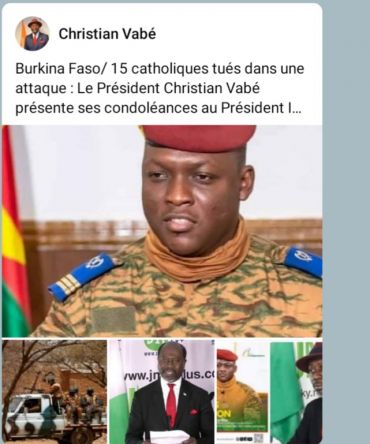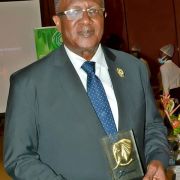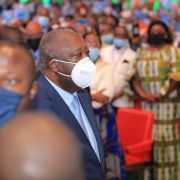Scandale diplomatique: Le patron de la DGSE sera-t-il auditionné par le régime Ouattara après la convocation du DP du journal "Aujourd’hui" ?
« Affaire Titi, DP du journal Aujourd’hui ». Vers l’audition par le régime Ouattara de Bernard Bajolet, patron des services secrets français.

Selon des sources sécuritaires bien introduites, monsieur Bernard Bajolet, patron de la DGSE, les services secrets français, serait dans le collimateur du régime Ouattara, après la convocation ce mardi 28 juillet par la gendarmerie ivoirienne des principaux responsables du quotidien « Aujourd’hui » pour affaire les concernant.
En effet, Joseph Titi, directeur de publication du quotidien AUJOURD’HUI et Sévérine Blé, rédactrice en chef du même journal, sont convoqués ce mardi à la Brigade de recherches de la gendarmerie nationale pour enquêtes judiciaires.
Ils sont convoqués pour avoir publié un rapport ultraconfidentiel des services secrets français, la Direction Générale de la Sécurité Extérieure (DGSE) lequel a accusé preuves à l’appui, le régime Ouattara d’achat massif d’armes via le Bénin pour un montant de 60 milliards de Fcfa, et de pillage des ressources de l’Etat avec sa famille via l’utilisation de doubles factures pour dissimuler les milliards de Fcfa détournés dans les caisses de l’Etat. La DGSE à la fin de son rapport a même recommandé l’intervention militaire directe de la France en Côte d’Ivoire où la situation est jugée quasi-explosive à 3 mois de l’élection présidentielle, avec les arrestations massives d’opposants et l’utilisation de la violence en lieu et place du dialogue politique (Lire…http://www.ivoirebusiness.net/?q=articles/c%C3%B4te-d%E2%80%99ivoire-les... et… http://www.ivoirebusiness.net/?q=articles/scandale-la-dgse-accuse-ouatta...).
La source du quotidien Aujourd’hui étant la DGSE, nos sources affirment qu’en réalité, c’est le patron la Direction Générale de la Sécurité Extérieure (DGSE), qui est dans le collimateur du régime Ouattara. Ce dernier pourrait donc être entendu par la brigade de recherches de la gendarmerie nationale dans le cadre d’une commission rogatoire internationale.
Si cette information était confirmée, ce serait une première dans les annales des relations diplomatiques entre la Côte d’Ivoire et la France. Ce sera surtout la détérioration des relations diplomatiques entre la France et la Côte d’Ivoire qui éclatera ainsi au grand jour. On frôlera sans nul doute l’incident diplomatique avec des conséquences extrêmement graves, car s’attaquer à la DGSE, c’est s’attaquer au Quai d’Orsay et à l’Elysée.
Nous y reviendrons.
Serge Touré
Qui est Bernard Bajolet?
Mr. Bernard Bajolet - Director General of External Security
Biography
Bernard Bajolet is originally from the Lorraine region (North East of France), where his family has been established for several centuries. He was born in 1949 and went to high school at the Lycée Henri Poincaré, in Nancy.
He studied political science at Sciences PoParis from 1968 to 1971. He then did his military service, mostly in Germany (11th Engineer Regiment in Rastatt).
After a one-year training period at the Saint-Etienne Prefecture, in the Loire region in 1973, he studied at the Ecole Nationale d’Administration (ENA, French National School of Public Administration) and graduated in 1975, class year Léon Blum. Among his fellow alumni are WTO Director-General Pascal Lamy, Alain Minc, Martine Aubry and Bernard Boucault…
As a new ENA graduate he chose to join the Ministry of Foreign Affairs, his long-term goal. Among the list of diplomatic postings offered he chose Algiers, where he served as Embassy Secretary. In 1978, he welcomed François Hollande, then ENAtrainee, who stayed in Algiers for eight months.
In 1978, he came back to Paris and worked with Foreign Affairs spokesperson Louis Delamare who was assassinated in Lebanon in 1981. Bernard Bajolet was following European issues and was the media contact for these matters. Then, Secretary of State for European Affairs Pierre Bernard-Raymond asked him to join his staff to work as point of contacts with the European Parliament, which had been elected by universal suffrage for the first time. Hence, Bernard Bajolet divided his time between Paris, Strasbourg, Brussels and Luxemburg in the offices of the European Parliament then chaired by Simone Veil.
In 1981, after a few months spent in New York in the French permanent representation to the UN, he was appointed Counsellor to the French Embassy in Rome at the Palazzo Farnese. His ambassador was former journalist Gilles Martinet, whom President François Mitterrand had just appointed. Bernard Bajolet was mainly in charge of politico-military issues.
From 1985 to 1986, Bernard Bajolet took a sabbatical year to study at Harvard University in Cambridge (Massachusetts) after which he wrote a report on “The United States and the Defence of Europe”.
Between 1986 and 1990, he was appointed deputy to French Ambassador in Syria Alain Grenier. He learnt the Syrian dialect and improved his classical Arabic. He then returned to Central Administration as Deputy Director for North Africa and the Middle East (ANMO). In 1991, Minister Roland Dumas had him appointed as the French Government’s special representative to the Madrid Peace Conference while retaining his functions at ANMO. He represented France within the Refugee Working Group for the Israeli-Palestinian Peace Process, held in Ottawa and Oslo, where he was appointed mediator for Palestinian Family Reunion. In 1993, he was part of the new “Picq commission” created by newly appointed Minister Alain Juppé, aiming to reform the Ministry of Foreign Affairs.
In 1994, he was appointed Ambassador to Amman, where he befriended King Hussein and his family.
From 1999 to 2003, he was appointed Ambassador to Sarajevo, where he learnt the local language. He was then posted to Iraq after the fall of Saddam Hussein in 2003, as head of the French Interests Section, under Romanian flag, as diplomatic relationships had been severed since 1991. He was then appointed Ambassador on July 13th, 2004 as the French flag once again flew over the French Embassy. During this period, he handled several hostage cases.
In late 2006, President Chirac appointed him Ambassador, high representative, in Algeria. In April 2008, in Guelma, he mentioned the “dreadful massacres” perpetrated in May 1945 and announced that the “time of denial was over”. President Sarkozy visited Algiers twice and in 2008 requested him to become the new National Intelligence Coordinator for the Presidency of the Republic. Under his authority, the first National Intelligence Requirements (PNOR – Plan National d’Orientation du Renseignement) was approved and the Intelligence Academy set up.
In early 2011, Bernard Bajolet was appointed Ambassador to Afghanistan where he received President Sarkozy on July 12th, 2011, and President Hollande on May 25th, 2012. During his mandate the Afghan transition process in the French-controlled territories (Kapisa province and the Surobi district) began, the French Forces withdrew and the Friendship and Co-operation Treaty was signed. He also handled several hostage cases.
On April 10, 2013, Bernard Bajolet was appointed by the Council of Ministers as Director General for External Security (DGSE). Then, on May 2nd, he was appointed Ambassador for Life (highest diplomatic rank).
Bernard Bajolet is Commander of the Legion of Honour and Knight in the French National Order of Merit.
He has a passion for history and likes classical music. He is a horse rider and a sailor
http://www.defense.gouv.fr/english/dgse/tout-le-site/mr.-bernard-bajolet...













